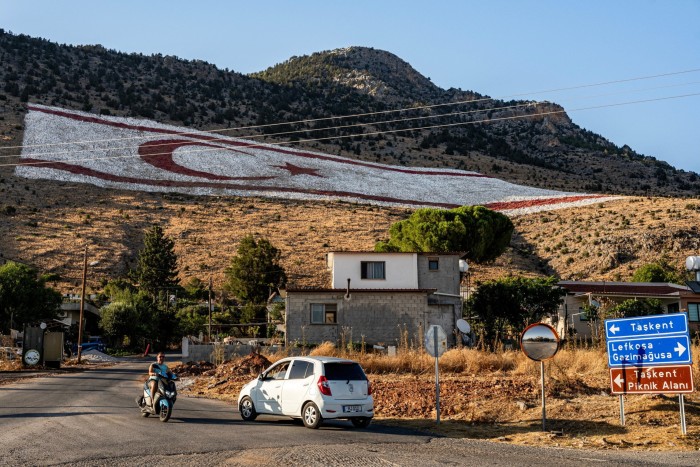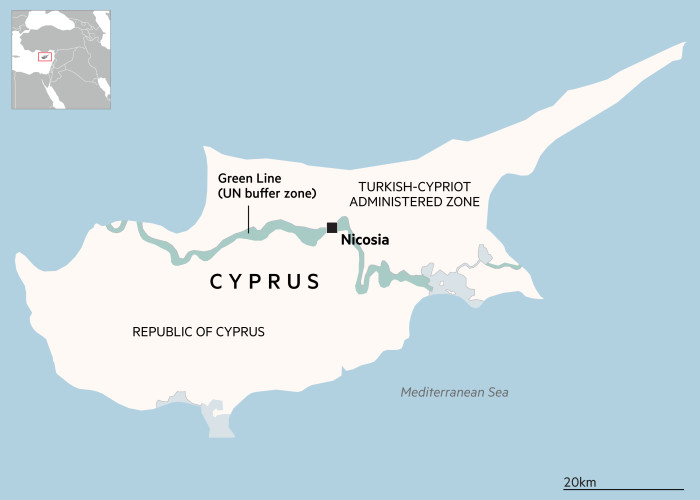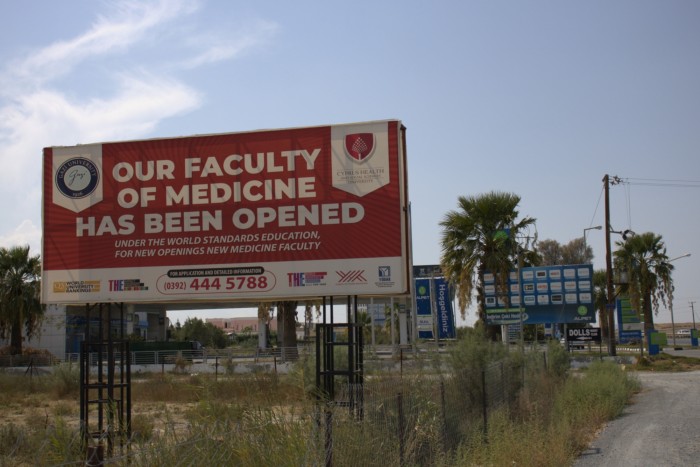
Kenyan student Ella’s overseas education began with a lie from a university recruitment agent: “Study in the EU.”
The 19-year-old first arrived on the Mediterranean island of Cyprus believing she was entering the Republic of Cyprus, an EU member state, to start an English language and literature degree.
Instead, she found herself enrolled at the Near East University (NEU) in the self-proclaimed Turkish Republic of Northern Cyprus, the occupied region in the north of the divided island recognised only by Ankara. The agent who took €1,400 in fees had vanished by the time she arrived.
“They sold the whole image of the republic to me,” Ella said. “When I looked up flights with the agent, he was showing me pictures of beaches in the south of the island.”

Northern Cyprus, which split from the Republic of Cyprus after Turkey invaded and occupied the region in 1974, has become a focus for entrepreneurs seeking to profit from selling higher education. In recent years there has been a surge in new projects, with the region now hosting 23 universities in an area smaller than the English county of Hampshire, with several more under construction. Most of them are privately owned.
Analysts say the sector is the main engine of the small Turkish-Cypriot economy, although there is no official GDP data.
Yödak, northern Cyprus’s higher education regulator, puts the student cohort at about 100,000 — somewhere between 10 and 20 per cent of the entire population, as the total number of inhabitants is disputed. Half the students come from Turkey and 40 per cent arrive from other countries. The rest are local.

But analysts and human rights groups warn that parts of the business have become mired in fraud and human rights abuses as unwary students fall prey to false promises and exploitation.
Agents for some institutions have also been accused of fuelling illegal immigration into Europe, as would-be asylum seekers and other migrants enrol as students before being smuggled across the Green Line — the UN buffer that separates the island’s two zones — into the neighbouring EU state.
“International students, particularly from African and Asian countries, are especially vulnerable to human trafficking,” Deniz Altiok, anti-trafficking co-ordinator at Turkish-Cypriot NGO the Human Rights Platform, told the Financial Times. “They fall victim to forced labour as well as sexual exploitation.”
This year’s US State Department Trafficking in Persons report warned of widespread workplace abuse of students in north Cyprus among those who have jobs, including confiscation of passports by unlicensed moneylenders and coercion into forced labour.
The Cypriot government has alleged some university applicants in the north are “ghost students” whose aim is to cross into the Republic of Cyprus and seek asylum. People-smuggling networks operate on both sides of the divide, according to local researchers.
From January to July this year, 5,081 asylum applications were submitted in the republic and 22,932 are pending — two-thirds of them from Syrians, according to the ministry responsible.
Nicholas Ioannides, deputy migration minister, said Cyprus could not handle so many migrants, adding that Turkey “must provide those individuals access to asylum procedures” and that Cyprus should not bear the burden for Turkey’s failure to comply with international law.
In June, Cyprus asked the European Association for Quality Assurance in Higher Education to investigate allegations of migrant smuggling via universities through the Green Line.

Some of the newer universities have also faced questions over academic standards. The unresolved status of the northern zone internationally has left most of them unaccredited by global authorities. They are instead overseen by Yödak, with 17 also regulated by Yök, Turkey’s council of higher education.
Entry requirements often appear lax, with many advertisements from agents asking only for a passport, CV and previous education record.
In March, the Cyprus Health and Social Sciences University (KTSU) was embroiled in a scandal after issuing more than 600 fake diplomas to students, leading to the arrest of several prominent figures, including a member of the university’s board of trustees and the former president of Yödak Dr Turgay Avcı, who resigned ahead of the investigation.
None has so far been charged or convicted. Yödak said it had launched its own probe into the affair.
Since arriving, Ella has changed tack to study law, because her original degree was only accredited by Yök whereas the law faculty is internationally accredited by the European Credit Transfer and Accumulation System.
Deceptive practices by recruiters used by the universities have also drawn criticism. Some advertisements picture the flag of the Republic of Cyprus alongside the names of private universities in the north, and promote non-existent scholarships.
The website of the American University of Cyprus in the north — which uses an identical name to a university in the south — claims it lies “in the very centre” of Nicosia, although it is 14km outside the island’s divided capital on a highway. The dusty campus shares the road with 14 strip clubs.
Neither AUC nor NEU responded to requests for comment.
Syrian student Mostafa, now 28, is among those deceived into believing he was heading for the EU, arriving in 2019 to study architecture at NEU after an agent promised him sandy beaches and access to Europe.
He described how he and thousands of other students seeking to escape war-torn or impoverished countries fell into what he called the “North Cyprus trap”.
He was guided through the admissions process by an agent who contacted him over WhatsApp on behalf of the university. On arrival he was given the keys to an apartment and pressed into signing a tenancy agreement. He paid €5,600 in tuition fees. The same night the agent vanished.
“These agents basically control a student’s life from the moment they touch down on the island, sucking the blood out,” Mostafa said.
He added that since graduating with a degree that he said would be “challenging” to have recognised anywhere but Turkey, he had been urged to become a university recruitment agent. He refused despite being told he could earn €40,000 per semester.
“I am a cog in this machine . . . It’s going to repeat itself until someone breaks the cycle,” he said.
Yödak said in a written statement that it had introduced new rules to ensure international student admissions were registered and monitored more effectively. “Additionally, there are provisions . . . regarding the regulation of agents and their terms of conduct,” it said.

It added that many individual programmes within the universities were internationally accredited, but it did not respond to a request for comment on the allegations that some colleges were fuelling illegal migration.
Not all students at the northern institutions are asylum-seekers or dupes. Egyptian law student Tayam Abdelazim, 24, applied to NEU despite knowing that her brother, a former student there, had found himself in the Turkish-controlled zone rather than the EU state.
Abdelazim was attracted by the low fees and is now president of Vois, an NGO for international students that raises awareness about the divided island and campaigns to eliminate universities’ use of unregulated recruitment agents.
“This is the best-case scenario for someone who doesn’t have Europe as an option,” she said. “As for refugees, they don’t want to go home for a reason. So if Cyprus is the only safe option, so be it.”